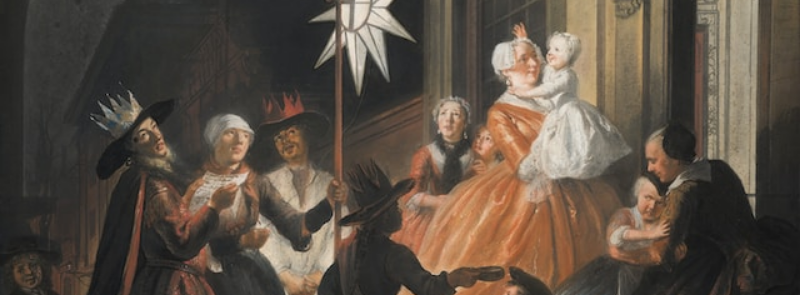
When It Occurs
Annually January 5th or 6th
Timeline
Days Passed (1146)
# Hashtags
#TwelfthNight #ChristianTradition
Twelfth Night, also recognized as Epiphany Eve, is a Christian festival that concludes the Twelve Days of Christmas, symbolizing the arrival of the Epiphany. Various traditions designate Twelfth Night on either January 5th or 6th, contingent upon whether the counting initiates on Christmas Day or December 26th.
Historical and Cultural Background
-
Christian Tradition: Twelfth Night is rooted in Christian tradition and marks the culmination of the Twelve Days of Christmas, which begin on Christmas Day (December 25th) and end on the eve of Epiphany.
-
Epiphany: Epiphany, observed on January 6th, commemorates the visit of the Magi or Three Wise Men to the infant Jesus, symbolizing the revelation of Christ to the Gentiles.
Customs and Celebrations
-
Feasting and Merrymaking: Twelfth Night is celebrated with feasting, parties, and festivities, often including special foods and drinks such as Twelfth Night cake or King Cake, which may contain a hidden charm or bean.
-
Role Reversals: In some cultures, Twelfth Night traditions include role reversals or the selection of a "Lord of Misrule," where a commoner temporarily assumes the role of a noble or authority figure.
-
Twelfth Night Play: Shakespeare's play "Twelfth Night, or What You Will" is traditionally performed during the Christmas season and explores themes of mistaken identity, love, and revelry.
Twelfth Night Cake and Charms
-
Cake Tradition: The Twelfth Night cake or King Cake is a central feature of celebrations. It may contain a hidden charm or figurine (such as a bean or coin), and the person who finds it in their slice is traditionally crowned "king" or "queen" of the festivities.
-
Symbolism: The hidden charm symbolizes luck, prosperity, and blessings for the finder throughout the year.
Modern Observance
-
Regional Variations: Twelfth Night customs and observances vary across regions and cultures, with some places placing more emphasis on religious observance while others focus on secular festivities.
-
Cultural Influence: In countries with Christian traditions, Twelfth Night is a time of joyous celebration, marking the end of the Christmas holiday season before returning to daily routines.
Conclusion
Twelfth Night holds significance as both a religious observance and a cultural celebration, marking the transition from the Christmas season to the Epiphany season. Through feasting, revelry, and traditional customs such as the Twelfth Night cake, it continues to be honored in various forms around the world, embodying themes of joy, community, and the spirit of renewal as people welcome the New Year and the revelation of Christ's presence among humanity.


